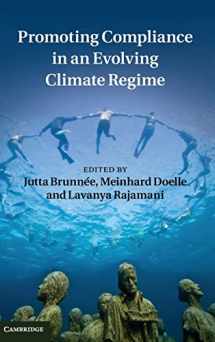
Promoting Compliance in an Evolving Climate Regime
ISBN-13:
9780521199483
ISBN-10:
0521199484
Edition:
Illustrated
Author:
Meinhard Doelle, Jutta Brunnée, Lavanya Rajamani
Publication date:
2012
Publisher:
Cambridge University Press
Format:
Hardcover
512 pages
Category:
Environmental & Natural Resources Law
FREE US shipping
on ALL non-marketplace orders
Marketplace
from $52.20
USD
Marketplace offers
Seller
Condition
Note
Seller
Condition
New
New - excellent clean condition, has a mark on the edge of the book, clean pages, Hard bound *** Cambridge University Press
Book details
ISBN-13:
9780521199483
ISBN-10:
0521199484
Edition:
Illustrated
Author:
Meinhard Doelle, Jutta Brunnée, Lavanya Rajamani
Publication date:
2012
Publisher:
Cambridge University Press
Format:
Hardcover
512 pages
Category:
Environmental & Natural Resources Law
Summary
Promoting Compliance in an Evolving Climate Regime (ISBN-13: 9780521199483 and ISBN-10: 0521199484), written by authors
Meinhard Doelle, Jutta Brunnée, Lavanya Rajamani, was published by Cambridge University Press in 2012.
With an overall rating of 3.5 stars, it's a notable title among other
Environmental & Natural Resources Law
books. You can easily purchase or rent Promoting Compliance in an Evolving Climate Regime (Hardcover) from BooksRun,
along with many other new and used
Environmental & Natural Resources Law
books
and textbooks.
And, if you're looking to sell your copy, our current buyback offer is $0.3.
Description
As the contours of a post-2012 climate regime begin to emerge, compliance issues will require increasing attention. This volume considers the questions that the trends in the climate negotiations raise for the regime's compliance system. It reviews the main features of the UN Framework Convention on Climate Change and its Kyoto Protocol, canvasses the literature on compliance theory and examines the broader experience with compliance mechanisms in other international environmental regimes. Against this backdrop, contributors examine the central elements of the existing compliance system, the practice of the Kyoto compliance procedure to date and the main compliance challenges encountered by key groups of states such as OECD countries, economies in transition and developing countries. These assessments anchor examinations of the strengths and weaknesses of the existing compliance tools and of the emerging, decentralized, 'bottom-up' approach introduced by the 2009 Copenhagen Accord and pursued by the 2010 Cancun Agreements.


We would LOVE it if you could help us and other readers by reviewing the book
Book review

Congratulations! We have received your book review.
{user}
{createdAt}
by {truncated_author}


